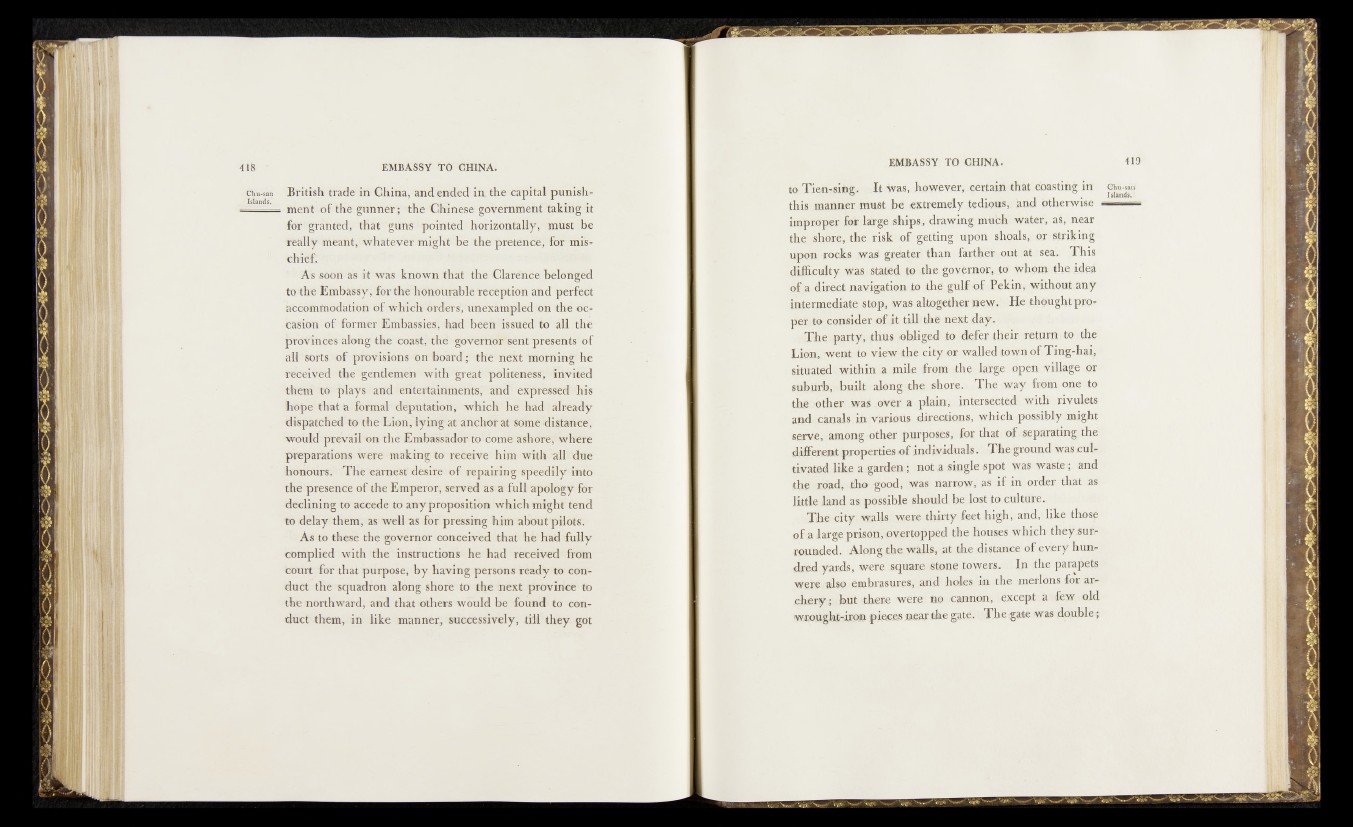
Ghg-san British trade in China, and ended in. the capital punish»-
Islands. • » * r , 1 , -,-vv- ,^-a. • .. ment or the gunner; the Chinese governmenttakingti
for' granted, that^guns pointed horizontally, must be
really meant,-whatever might'be the pretence, for mischief^
'
As soon as it was known that the Clarence belonged
to the Embassy, for the honourable reception and perfect
äccÄftOdation of whiehorders', unexampled on the o ccasion
of former Embassies, had been issued to all the
provinces along the coast, the goverhohsent presents of
all sorts of provisions on board; the next morningMie
received the gentlemen with great politeness; invited
them to plays and entertainments, and expfèesed'his
hope that a formal deputation, which he had ; already
dispatehed: to the fcion, lyiffigat anchorat sonm distance,
would prevail on the Embassador to’comÉ ashore, where
preparations were making to receive him with all-'due
honours. The earnest’desire of repairing speedlfy into
the presence of the Emperor, served as a füll'apology for
declining to accede to any proposition which might tend
to delay them, as well as for pressing him about pilots.
As to these the governor conceived that hè' had fully
complied with the instructions he had received from
court for that purpose, by having persons ready to conduct
the squadron along shore to the next province to
the northward, and that others would be found to conduct
them, in like manner, successively, dll they got
to Tien-sihs. It was, howfeter, certain that coasting, in flWwte ws. - Islands.
this manner must be extremely tedious, and otherwise ^ . . . t
improper for large ships, drawing much water, aS, near
the,,»afe^the. risk c^f,getting updh^slpals^’Or striking
upon rocks was greater than farther out at sea. This
difficulty was stated to the governor^ fo whom.' the idea
o^a direct navigation to: th£ gulf o f T#k.in, without any
interpediate stop, was altogether new. Ife thought proper
to consider of it till the next day.
The p^rtyi thus obliged to defer theif return to the
lio n , went to view the city or walled fown of Ting-hai,
situated within .a mile from the i# g e :apen; vhfageor
suburb, built along the. shore. :jhO way from one to
tine other was .over a plain, intersected with rivulets
and canals in various directions, which, possibly might
serve, among other purposes,- for that of'separating the
different properties o f individuals • The ground was cultivated
like a garden ; not a single spot IvaS waste? and
the road, the good, was narrow,. as: .if in order that as
little land as possible should be lost to culture.
The city walls were thirty feet highj andr like those
of .a large prison, overtopped the houses which they surrounded.
Along the walls, at the distancenf every hundred
yards, were s q u ^ stone towers. Ip the parapets
were also embrasures, and holes in the morions for archery;
but there were no can-noEix, except a ifew old
wrnughfoiroin pieces nearthe g ite ,T h e gate was double 5